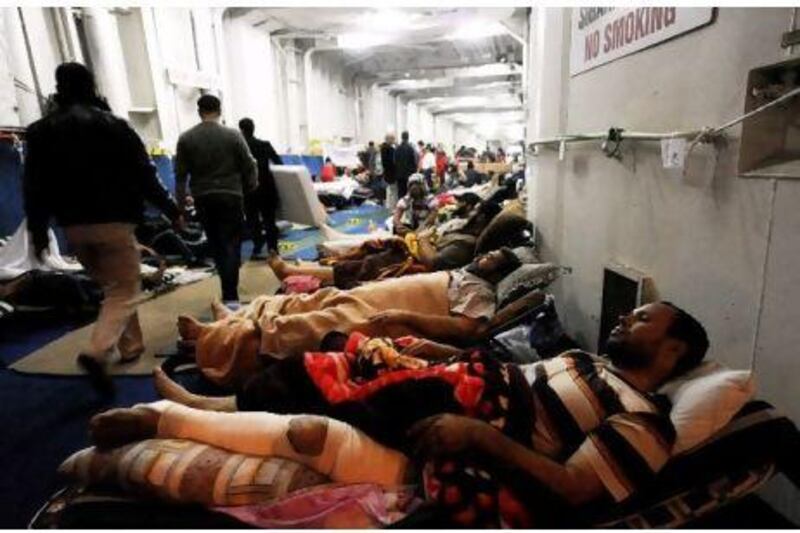ISTANBUL // Turkey, the only Muslim Nato member and a rising regional power, has waded deeper into the Libyan crisis by sending a ship with military escort to pick up 230 injured people from the embattled Libyan city of Misrata and by redoubling its efforts to broker a ceasefire in the north African country.
The action in Misrata was the biggest single humanitarian relief operation by a foreign power in the Libyan conflict so far, a Turkish diplomat said yesterday. Ankara argues that a combination of humanitarian aid and discreet talks about a possible transition of power with both the government of Col Muammar Qaddafi and the Libyan opposition offer a better chance to end the confrontation in the north African country than Nato airstrikes.
Ahmet Davutoglu, the Turkish foreign minister, said that Abdelati Laabidi, Libya's deputy foreign secretary, was expected in Ankara later yesterday after a visit to Athens. Mr Davutoglu added Turkey was also talking to the opposition and said representatives of the Libyan National Transitional Council were expected in Ankara "in the coming days".
"We are the only country that talks to both sides in Libya," Mr Davutoglu said after meeting Anders Fogh Rasmussen, the general secretary of the alliance, in Ankara yesterday. Mr Rasmussen also met with Recep Tayyip Erdogan, the Turkish prime minister, and with Vecdi Gonul, the defence minister, during his brief visit.
Turkey was trying to find out whether there was enough common ground for a ceasefire, the Turkish diplomat, who requested anonymity because of the sensitivity of the issue, said. "We're not there yet." According to Turkish news reports, the issue of a possible ceasefire was also raised in the meeting between Mr Erdogan and the NATO general secretary.
For Turkey, the Libyan crisis is an opportunity to showcase its role as a regional mediator. Economic interests form another reason Ankara is so keen on ending the turmoil in Libya. Turkish companies raked in contracts worth $27bn (Dh99bn) in Libya in recent years, according to the government in Ankara. Before the start of the uprising, around 25,000 Turkish nationals lived and worked in Libya.
Mr Davutoglu informed Mr Rasmussen about the evacuation of wounded Libyans by ship. "Misrata is a city that has been under siege for a long time and where civilians have been living under very bad conditions," Turkish media quoted the Turkish foreign minister as saying after his meeting with the Nato general secretary.
The Ankara, a car ferry that was turned into a hospital ship, complete with a 15-member medical team on board and several tons of medical supplies, docked in Misrata on Saturday, according to the ministry. Twelve Turkish F-16 fighter jets and a frigate provided military cover. Members of Turkey's special police were on board the Ankara for further protection, but did not leave the ship in Misrata, according to Turkish diplomatic sources.
"Intense consultations and coordination efforts with the parties in Libya" made sure there was no fighting in the harbour area of Misrata during the stay of the Ankara, the foreign ministry said. Turkey secured a 12-hour ceasefire in the city to protect the "breath-taking operation", the Sabah newspaper reported. The ship took 230 wounded and 60 relatives of the victims on board.
Before heading for Turkey yesterday, the Ankara picked up another 70 wounded and 30 Turkish citizens, as well as other nationals in Benghazi, the rebel stronghold in eastern Libya. After its arrival at the Western Turkish port of Cesme, the injured will be taken to hospital.
The mission of the Ankara is the latest example for Turkey's approach in the Libyan conflict, which rests on humanitarian and diplomatic efforts and regards military action by the West with scepticism. Last week, Mr Erdogan announced that his country was taking over the airport at Benghazi to bring in relief goods. Turkish diplomats say that Ankara had been trying to get the government and the opposition in Libya to agree on a transition of power but that its efforts were interrupted by the start of the bombing campaign, controlled by Nato, on March 19.Ankara says it is just as convinced as its Western partners that Mr Qaddafi will have to step aside, but is pursuing that aim by diplomatic efforts. "We do not support Qaddafi, but we support a solution that both sides can live with," a Turkish diplomat said last week. Turkey also criticised the West for starting the bombing in Libya without a political strategy. "We have to decide on the end game," the Turkish diplomat said. "What does everybody want? Remove Qaddafi? What happens when Qaddafi is gone?"
Turkey has said it will not take part in the airstrikes, but it has agreed to Nato taking over the enforcement of the no-fly zone over Libya and has joined Nato efforts to implement the arms embargo against the country. Turkey also shares Mr Rasmussen's rejection of arms deliveries to the Libyan rebels.
Mr Rasmussen and his Turkish hosts do not agree on all aspects of the Libyan conflict, however. According to Turkish news reports, Mr Erdogan was expected to remind Mr Rasmussen of the need to avoid civilian casualties during the Western airstrikes and to end the military intervention as soon as possible.
Two years ago, Turkey opposed Mr Rasmussen's candidacy for the job of Nato general secretary because Mr Rasmussen, as Danish prime minister, rejected an apology after a Danish newspaper published several cartoons depicting the prophet Mohammed in 2005.






